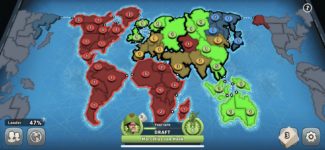Bastion
LQ: 9.15
Recommended Age: 10+
Skills Used: Planning, Working Memory, Mathematics, Reading

Risk is an app version of a classic world domination board game. The digital version of this game has several variations of the game in single player mode, pass & play (or multiplayer on one device) mode, global domination (challenge players online) mode, and play friends (online) mode.
The classic version of the game requires the player to place armies on a world map. They then choose a country (touching one they already own) and attack it. The winner is determined by a dice roll that is done automatically by the app. If they win the dice roll, they win the country and move their armies into it. They can then attack again or end their turn. The goal of the game is to take out all the other players and own the world.
Some of the games require tokens to play. The player earns tokens by winning a game. They also refill at a rate of one token every 30 minutes. The game keeps track of a variety of stats for the player, including wins, types of games played, and number of armies lost. There are extra game boards available for purchase, as well as a premium mode which includes unlimited tokens. The ESRB rated Risk E for Everyone and LW4K stands by this rating.
Risk helps kids practice and improve the following skills:

Adapting and adjusting to changing conditions and expectations.
Because Risk is a board game where you play against other players (sometimes even a computer in the app version), the player has to be flexible. The player could have the best plan laid out, knowing exactly where they are going to go and how they are going to dominate the world, but the other players can interfere with it. The element of random dice rolls can also impact what the player has to do. They might have the advantage of more armies against a competitor's country, but if the dice come out the wrong way, they might still lose. When any of this happens, the player has to adjust to these new "obstacles" and adapt to the changes they now have to make in their plan. If they don't, they will not win the game.
Developing and retaining information in our minds while working.
This game has a lot of similarities to chess. The player needs to solve the problem of how to beat all of their opponents. Which one to take out first, for example, and even which country to try and take over first. They also need to know when to leave a bunch of armies in one country in order to protect other countries they may own. And they need to plan out several steps and attacks and even turns at a time. Just like in chess, they may not get to follow through with their plan because of something a fellow player has done, but they need to have several steps planned out. And because these games can last 30 or 60 minutes--or more--the player has to maintain a long-term plan. If they don't, they will not be able to win.
All membership plans come with full access to our entire suite of tools learning guides, and resources. Here are a few of the ones we think you’ll like the most: